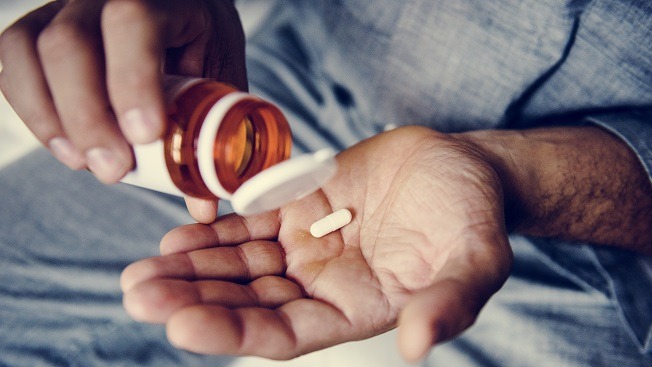The verdict of whether men should consider taking a vitamin-mineral supplement for prostate health is yet to be determined. Most studies reviewing the efficacy of nutritional supplements actually proving they can lower or even prevent prostate cancer has not shown any promising results. In some cases, it appears that certain nutrients when taken as a supplement could actually increase prostate cancer risk. At this time, advice for men on taking nutritional supplements is sketchy.
Supplements for prostate cancer prevention
Some men question or are curious about certain nutrients’ ability to help lower prostate cancer risk and if taking a supplement above the recommended dosage set by the Dietary Guidelines is advised or not. Here’s a look at specific vitamins and minerals that when taken in a pill form or supplement, what effect if any, they have on influencing prostate cancer risk;
-
Vitamin B12
This water-soluble vitamin has an essential role in cell metabolism, nerve function, red blood cell formation, and helps make DNA. Our body does not make vitamin B12 and only animal-based foods (milk, eggs, beef, poultry, fish, pork) contain it naturally. Any man who is a vegan should consider taking a supplement of vitamin B12.
There are few studies showing an association between vitamin B12 supplements and either lowering or increasing the risk of prostate cancer. Men who consume B12 through food sources should have adequate levels of this vitamin or if they have concerns, should ask their doctor about testing for it.
-
Vitamin E
Vitamin E, an antioxidant, is generally not advised to take as a supplement. Most men are able to adequately obtain this fat-soluble vitamin from food sources such as vegetable oils, sunflower seeds, peanuts, and peanut butter, spinach, and red bell peppers. High doses of vitamin E (more than 400 international units or IU daily) should be avoided. A 2011 National Institutes of Health (NIH) funded study found that men who took vitamin E had higher rates of prostate cancer and particularly aggressive prostate cancer.
-
Selenium
Selenium, a mineral naturally found in the soil and food sources such as Brazil nuts, seafood and organ meats, was also studied in the 2011 NIH study. It’s best known for proper thyroid gland functioning, DNA production and protecting the body from free radicals. Results from this study showed that men taking selenium supplements had an associated slighter increase in prostate cancer risk but was not significantly significant.
-
Vitamin D
In recent years, vitamin D deficiency has been linked to an increased risk of aggressive prostate cancer. Especially for African-American and European-American men who had deficiencies of this fat-soluble vitamin. Men should be regularly screened for vitamin D levels to assess if they need to take a vitamin D supplement or not. The human body can make vitamin D from sunlight with the best time of day to be outdoors is noontime. There are few foods that naturally contain vitamin D but the best sources are milk fortified with D, fatty fish like salmon or tuna, egg yolks, and liver. If a man is deficient in vitamin D, he should ask his doctor what amount he should take from a supplement.
-
Lycopene
Lycopene is an antioxidant belonging to the carotenoid family providing the brilliant red and pink colors found in tomatoes, grapefruit, watermelons, and papayas. It has been associated with lowering the risk of prostate cancer. There is no official recommendation of a daily intake for lycopene but it’s estimated to be about 2 milligrams of lycopene each day which is the amount found in a ½ cup of cherry tomatoes.
A 2014 observational study found men who regularly consume lycopene-rich foods had lower rates of prostate cancer and prostate cancer deaths. Keep in mind, this study was based on food sources of lycopene; studies of lycopene supplements have not found any benefit.
-
Multivitamins
A 2007 NIH-AARP study of multivitamins and prostate cancer found that men taking these supplements in large amounts of more than 7 times a week may have an increased risk of advanced and fatal prostate cancer when compared to men who did not take multivitamins.
Multivitamins are often recommended as an unproven “insurance policy” just in case anyone, including men, has a poor diet. However, most men (and women) who already eat well gain little from taking a multivitamin. Simply put, we absorb nutrients best by eating healthy foods daily. When men focus on including more fruits, vegetables, nuts, seeds, beans, lean meat, fatty fish, and poultry, this is the best way to get the vital nutrients they need to support prostate health.
Bottom line
Men are advised to always speak to their healthcare provider before taking any nutritional supplement. At this time, studies have not shown sufficient evidence to support the use of vitamin or mineral supplements (with the exception of vitamin D) to prevent prostate cancer. The focus should be on living a healthy lifestyle of eating nutritious foods at least 90 percent of the time, maintain healthy body weight, and exercise regularly to help lower prostate cancer risk.


